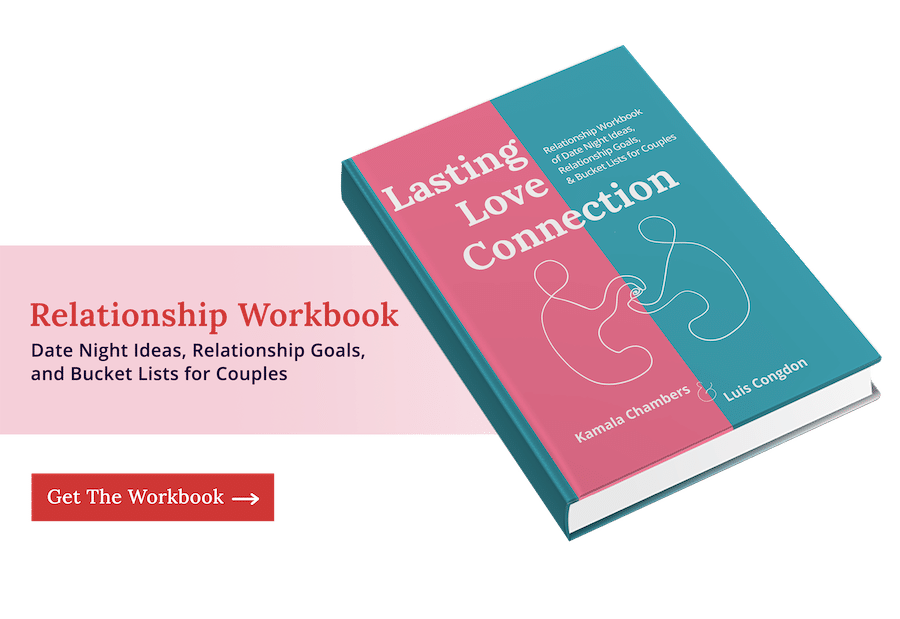If you’re wondering, “Are there consequences of staying in an unhappy marriage?” the answer is yes.
Feeling unhappy in your marriage impacts countless aspects of your life.
However, it doesn’t have to stay that way.
You can get your marriage back on track and reap the wonderful benefits of a loving relationship.
This article explores the signs of an unhappy marriage and the nine consequences of staying in an unhappy marriage.
Additionally, we will discuss what to do if you find yourself in an unhappy marriage.
Table of Contents
What are the signs of an unhappy marriage?
First, let’s explore the warning signs that indicate your marriage is not going well.
Also, you’ll be able to take an unhappy marriage quiz to gain clarity about the state of your relationship.
You may be in an unhappy marriage if
- You and your partner are constantly arguing without reaching a resolution.
- You’ve stopped talking about certain topics altogether.
- Conflicts include criticism, contempt, defensiveness, and stonewalling (also known as the Four Horsemen).
- You’re no longer having sex or physical intimacy.
- You don’t feel safe expressing your feelings or needs.
- You’ve stopped spending time together.
- Date nights feel like a distant memory.
- You sense your partner has lost interest in you.
- You feel more like roommates than romantic partners.
- There is a lack of trust between you.
- You feel controlled by your partner or stuck in unhealthy relationship dynamics.
- You feel neglected and lonely in your relationship.
- One of both of you threaten divorce.
If you feel that something is off in your long-term relationship, it’s a clear sign that you are unhappy in your marriage.
To gain more insight into the state of your marriage, take our free relationship checkup.
Related Reading: Signs Of A Toxic Marriage & 15 Signs Your Marriage Will End in Divorce
9 consequences of staying in an unhappy marriage
Now, let’s delve into how an unhappy marriage affects your mental and emotional health, physical well-being, and overall life satisfaction.
1. Increased stress

Remaining in an unhappy marriage leads to elevated levels of stress.
Persistent and intense stress can negatively impact your mental and physical health.
Chronic stress wreaks havoc on all bodily systems, including digestion, heart health, and brain function.
Furthermore, stress can trigger mental health symptoms, such as increased anxiety and depression.
2. Higher risk of mental health issues

Staying in a loveless marriage, filled with unresolved conflict or emotional distance, leads to negative effects on your mental health.
Related Reading: 29 Signs He Doesn’t Love You Anymore
Anxiety and depression
Research indicates that people in unhappy marriages are more likely to develop anxiety or depression.
Ongoing symptoms of anxiety or depression make it challenging to function in day-to-day life.
Post-traumatic stress disorder (PTSD)
Contrary to common belief, post-traumatic stress disorder (PTSD) can develop without a person having to experience a life-threatening event such as combat or a car accident.
In some cases, being betrayed by a partner is traumatic, resulting in a paralyzing fear response characteristic of PTSD.
Common symptoms of PTSD include
- Recurring flashbacks of the traumatic event that trigger deep fear and anxiety.
- Avoidance of anything that triggers memories of the event.
- Heightened anxiety or irritability.
- Distorted thoughts about oneself or the world.
- Loss of enjoyment in usual activities.
If you believe you may be experiencing symptoms of PTSD, seek professional help.
A mental health professional will help you determine a path forward.
3. Your physical health suffers as one of the consequences of staying in an unhappy marriage

Additionally, remaining in an unhappy marriage affects your physical well-being.
Research shows that having an unhappy marriage increases the likelihood of developing physical health problems such as high blood pressure, cancer, diabetes, and heart disease.
Studies discovered that loving relationships may prevent the progression of heart disease, whereas unhappy marriages can deteriorate cardiovascular health.
You get sick more often
In another study, researchers found that having a contemptuous partner elevates the level of stress hormones in your body and weakens your immune system.
If you are constantly stressed, your immune system can become compromised.
Consequently, you may get sick more frequently and take longer to recover.
4. Low self-esteem

Remaining in an unhappy marriage decreases your self-esteem.
In a bad marriage, it’s common to start doubting your self-worth, especially if you haven’t cultivated secure identities outside the relationship.
You might even start to question if you’re worthy of love at all.
When you struggle with low self-esteem, you may be less inclined to work on improving your relationship or making the difficult decision to end it.
Also, low self-esteem often leads to symptoms of anxiety or depression.
5. Decreased productivity at work

It’s common for negative feelings toward your partner to affect your work life.
Turmoil at home can lead you to dwell on the situation while at work, making it difficult to focus and finish tasks.
Additionally, the stress from your relationship may impact your sleep, which impacts your mood and energy levels during the day.
6. Negative impact on children

Many couples believe it’s best to “stay together for the kids.”
However, the consequences of staying in an unhappy marriage extend beyond just the married couple.
Remaining in a bad relationship deeply affects your children.
Research shows that staying in bad marriages “for the sake of the kids” can do more harm than good.
Studies have indicated that children frequently exposed to intense conflict at home are at a greater risk of experiencing mental and physical health issues, academic difficulties, and struggles with social and interpersonal relationships.
Additionally, the behaviors and attitudes children witness in their parents influence their approach to love.
For instance, if children grow up observing constant fighting or the cold shoulder between their parents, they may begin to view this behavior as normal and repeat it in their future romantic relationships.
7. You become increasingly disconnected

Being in an unhappy marriage often leads to feeling disconnected from yourself.
Staying in a relationship where you feel drained and unfulfilled is a form of self-betrayal.
Over time, you become less in tune with your feelings and neglect your needs.
You withdraw from friends and family
Further, staying in an unhappy marriage affects your relationships with family and friends.
Your loved ones may notice signs of an unhealthy relationship but not know how to help.
If they have brought up their concerns, it’s possible that you became defensive and unreceptive to their feedback.
You may feel ashamed about staying in an unhealthy marriage, leading you to withdraw from important people in your life.
8. Your ideas about a healthy relationship become distorted

Additionally, staying in a loveless marriage shifts your perspective on relationships.
If your partner frequently criticizes you or neglects you emotionally, it’s understandable that you start to believe this is what a relationship is like.
In turn, you may continue seeking out bad relationships.
Related Reading: The Difference Between Healthy & Unhealthy Relationships
9. You limit your happiness

Remaining in an unhappy marriage prevents you from finding happiness and fulfillment.
Choosing to stay with a partner who cannot meet your emotional needs denies you the beautiful benefits of loving relationships.
Settling for an unfulfilling marriage deprives you of the love, intimacy, and closeness you could experience with another person.
What should I do if I’m in an unhappy marriage?
If you’re unhappy in your marriage, it’s normal to feel stuck.
You want to stop arguing with your partner and express yourself fully without fear of judgment.
You want to feel close and connected once again.
However, you don’t know if repairing your relationship is even possible.
Please know that there is hope.
You can turn things around and move toward the fulfilling relationship you long for.
Talk to your partner
Start by checking in with your partner.
They might not realize that you feel distant or emotionally shut down.
During your relationship check-in, focus on your own feelings rather than your partner’s behavior.
For example, you could say, “I feel unheard when…” or “I feel rejected when…”
For step-by-step support with relationship check-ins and guided prompts to discuss with your partner, pick up the Relationship Workbook.

Try something new

Breaking out of your comfortable routine and trying something new with your partner is your best bet for reigniting the spark.
Invite your partner on a date night.
What’s something you’ve always wanted to do together but never have?
A study from Stony Brook University found that participating in new activities together brings back the same excitement and “in-love” feelings as when you first started dating.
Consider couples therapy and relationship coaching
It is difficult to address serious problems and break out of old patterns on your own.
Sometimes, we need the guidance of an expert to find a path forward.
When you work with a couples therapist or relationship coach, you’ll gain the tools to build a successful marriage.
Book a couples consultation to see if working with us would be a good fit.
Prioritize mental and physical health

As we’ve discussed, feeling unfulfilled in your marriage takes a toll on you.
While you navigate relationship conflict and challenges, don’t neglect self-care.
Even if your partner isn’t showing up how you wish they would, you can still meet your own needs and focus on self-love.
Get your marriage back on track
No matter how hopeless things seem, your marriage is not beyond repair.
With the right support, you can develop new ways of relating and build the happy marriage you long for.
To get started, sign up for the Save Your Marriage Course.

What are the negative effects of staying in an unhappy marriage?
Staying in an unhappy marriage can create emotional distress, anxiety, and resentment, eroding both people’s mental and emotional well-being. This emotional turmoil can also lead to physical health problems, resulting in stress-related illnesses and a lower overall quality of life. Therefore, resolving relationship problems is essential.
Is it better to divorce or stay in an unhappy marriage?
If you’re wondering if you should get a divorce or remain unhappy in your relationship, consider there is another option altogether. Divorce can be one of the most significant financial and emotional drains. Whereas an unhappy marriage can greatly impact your emotional and mental health. If you’re unhappily married, get support. While there are consequences of staying in an unhappy marriage, there are also significant repercussions associated with divorce.
The divorce process is costly, financially and emotionally. Divorce is never a decision to take lightly. If you’re considering divorce, seek support from a marriage and family therapist or relationship coach.
Related Reading: Effects of Divorce on Children






0 Comments